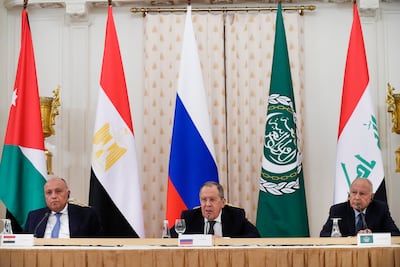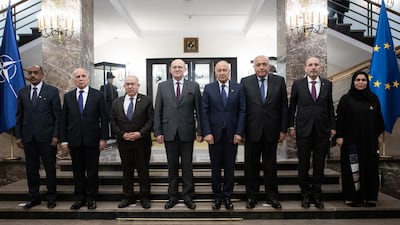Live updates: follow the latest news on Russia-Ukraine
A delegation of Arab League foreign ministers led by the organisation’s chief arrived in Poland on Tuesday after visiting Russia where they offered to mediate between the two warring nations.
The war has had a devastating financial impact on some Arab nations, particularly Egypt, Sudan, Lebanon and Tunisia, because of their heavy reliance on wheat imports from Russia and Ukraine.
Other regional countries including Iraq, Syria and Jordan have also seen food import bills surging, or have been affected by other commodity price rises.
The delegation, led by Arab League Secretary-General Ahmed Aboul Gheit and foreign ministers and senior officials from Egypt, Sudan, Algeria, Jordan and the UAE — the current Arab member of the UN Security Council — flew to Warsaw from Moscow where they held talks with Foreign Minister Sergey Lavrov.
They met Ukrainian Foreign Minister Dmytro Kuleba on Tuesday.

The Jordanian Foreign Ministry said they discussed “Arab efforts to resolve the Ukrainian crisis and review Poland’s measures to facilitate the transit of Arab citizens who fled Ukraine.”
Many Arabs residing in Ukraine have complained of ill treatment by Polish authorities on the border with Ukraine, with some left stranded in the region for days.
Russia’s invasion of its neighbour in February has disrupted already fragile global supply chains, driving up energy and food prices. Combined, the effects of the war have fuelled inflation across the globe, including in many Arab countries, where it has also disrupted the delicate and politically-sensitive food balance.
Other mediation attempts by countries such as France, Israel and Turkey have so far failed to make any progress.
But the Arab League's record in mediating an end to conflicts in its region does not compare well, in part due to the intractable nature of many regional conflicts which have run across political, tribal, ethnic and religious lines.
However, the Arab League’s mediation offer carries some weight because its members have extensive and complex economic and political ties with the two nations and its readiness to search for a diplomatic solution to the conflict reflects a genuinely serious concern in the region over the effects of a prolonged war.
The Arab League also wants to see the conflict end because, analysts say, it has shifted international attention away from pressing regional issues like Iran’s menacing role in the area, the turmoil in Libya, Lebanon’s worsening economy and the Arab-Israeli conflict.
Of the 22 member states of the Arab League, Egypt, Lebanon, Syria, Libya and Tunisia are the biggest wheat importers and the hardest hit by the spike in its price since the war broke out.
Egypt is perhaps the most potent example of an Arab country hit hard by the war.
As the world’s largest wheat importer, bringing in around 13 million tonnes last year — Egypt normally secures 80 per cent of its wheat from Russia and Ukraine.
To weather the fallout from the war, Egypt has banned the export of wheat for three months, devalued its currency by 14 per cent, raised key interest rates and started talks with the IMF on securing a possible aid package to help it get through the crisis.
Western sanctions slapped on Russia after its invasion of Ukraine also leave Egypt’s years-long procurement of weapons from Moscow in limbo and throw into doubt Cairo’s plans for Russia to build its first nuclear power station.




























